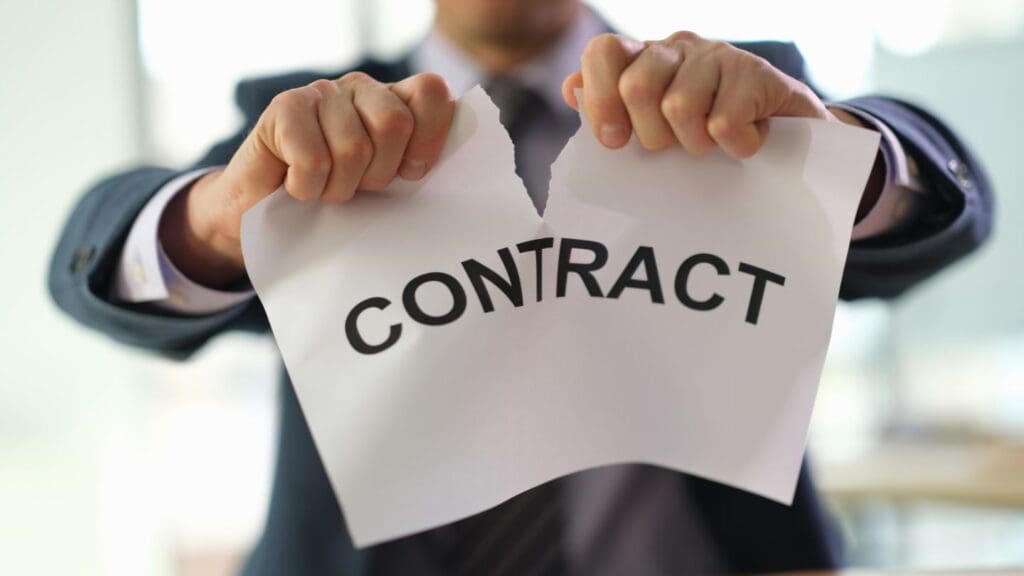If you’re dealing with a contract dispute, knowing the four elements of a breach of contract claim is crucial. These key elements include establishing that a valid contract exists, proving that you performed your part or had a valid reason not to, showing that the other party breached the contract, and demonstrating the damages you suffered as a result. In this blog, we’ll guide you through each of these elements and explain how they impact your ability to make a successful claim.
Key Takeaways
- A breach of contract claim requires proof of a valid contract, performance by the plaintiff, a breach by the defendant, and resulting damages.
- Understanding the distinctions between written and oral contracts, along with the Statute of Frauds, is crucial for enforcing contractual obligations.
- Timely filing of breach of contract claims is essential due to statutory limitations, with exceptions available in specific circumstances.
Establishing a Valid Contract
The foundation of any breach of contract claim lies in proving that a valid contract existed. Without a valid contract, there can be no claim for breach. A valid contract typically includes six key elements: offer and acceptance, legal purpose, mutual assent, clearly defined terms, consideration, and competent parties. These elements ensure that the agreement is legally binding and enforceable.
In debt collection cases, a valid contract often includes agreements for services, delivery of goods, or repayment terms for loans. Businesses must demonstrate the terms of these contracts and provide supporting documentation like invoices, payment schedules, and written agreements. Failure to meet these terms, such as a client refusing to pay after receiving services, constitutes a breach of contract.
Written vs. Oral Contracts
When pursuing unpaid debts, it’s crucial to differentiate between written and oral contracts. Written contracts provide a tangible form that clearly defines the terms and obligations of all parties, which can be presented as concrete evidence during recovery proceedings. This clarity makes enforcing debt recovery more straightforward.
On the other hand, oral contracts are legally enforceable but inherently challenging due to the lack of physical documentation. In such cases, professional debt collection attorneys rely on indirect evidence like email communication, payment history, or witness testimony to establish the agreement and breach.
Statute of Frauds
The Statute of Frauds is a legal principle mandating that for certain contracts to be legally binding, they must be in written form. Contracts falling under this requirement typically include those pertaining to the sale of land, agreements related to marriage, and wills. The intent behind the Statute of Frauds is to prevent potential fraud and misunderstandings by guaranteeing that critical contract terms are explicitly recorded.
Despite this stipulation, there are particular exceptions where courts may uphold a contract even without written evidence. For example, should one party depend on an oral agreement and commence executing their contractual obligations based upon it, courts might enforce the said agreement with an aim at averting unjust detriment toward the acting party.
It’s crucial for parties entangled in disputes over contracts to understand these subtleties thoroughly.
Proving Plaintiff’s Performance or Excuse for Nonperformance

To recover outstanding debts arising from breached contracts, businesses must demonstrate they fulfilled their obligations as per the agreement. Professional legal services ensure this process is handled meticulously by collecting supporting evidence, such as signed contracts, delivery confirmations, and payment requests.
If a business faces valid obstacles preventing complete performance, such as supply chain disruptions, professional attorneys can argue exceptions like “impracticability” to safeguard their interests while still pursuing recovery for damages.
Partial Performance
In debt recovery cases, partial performance often arises when a business delivers part of its goods or services but does not receive full payment. For instance, a vendor may deliver 80% of a shipment, and the client refuses to pay for any of it. Attorneys specializing in debt collection know how to argue that partial performance warrants compensation, especially when documentation like delivery records and purchase orders is available.
Professionals ensure that even if full performance is not possible, businesses recover the value of what has already been provided.
Demonstrating Defendant’s Breach
Once the plaintiff’s fulfillment of contractual obligations is established, proving the defendant’s breach becomes the focus. In debt recovery, this means showing clear evidence of non-payment, missed deadlines, or refusal to honor payment agreements.
Legal professionals collect evidence such as outstanding invoices, formal communication records, and prior payment agreements to demonstrate how the other party failed to meet their obligations. Attorneys can also send demand letters or initiate legal proceedings to hold the breaching party accountable.
Material vs. Minor Breach
In the context of unpaid debts, a material breach—such as non-payment for delivered goods or completed services—has a significant impact on the injured party’s ability to operate or maintain cash flow. A minor breach, such as a delayed payment with subsequent fulfillment, may not warrant the same legal response.
Professionals assess the severity of the breach, calculate the financial impact, and determine the best course of action, whether through settlement negotiations or litigation.
Anticipatory Breach
When one party signals their intent not to meet the contractual obligations ahead of when they are supposed to perform, an anticipatory breach takes place. This allows the non-breaching party to pursue legal action right away instead of having to wait for the actual violation of contract terms.
It is essential to recognize anticipatory breaches promptly in order to respond legally in a timely and efficient manner.
Showing Damages Resulting from the Breach
To recover damages, businesses must demonstrate financial losses resulting from the breach. In cases of unpaid debts, this includes outstanding balances, interest fees, and additional costs incurred while attempting to recover payment.
Professional debt collection attorneys use detailed financial records, payment logs, and contracts to prove these damages. Additionally, they calculate fair compensation based on lost profits or operational disruptions caused by non-payment.
Types of Damages
Breach of contract claims can result in a variety of damages being awarded. Compensatory damages serve the purpose of reimbursing the non-breaching party for direct losses and expenses that arise as a consequence of the breach. The amount given is calculated from the tangible losses sustained by this party due to the contract violation.
Alternatively, consequential damages pertain to indirect losses, which are not an immediate outcome of the breach but were reasonably anticipated following it. For instance, should a company endure lost earnings resulting from a contract breach, those financial impacts could be recognized as consequential damages.
In certain instances where monetary compensation fails to adequately resolve issues arising from breaching contracts, specific performance may be mandated by courts. Such an order is commonly applied in situations with distinctive items at stake, like transactions involving real estate properties.
Defenses Against Breach of Contract Claims

Professional attorneys anticipate defenses often raised by breaching parties in unpaid debt cases. Defendants may claim that a contract was invalid or that they were unable to fulfill obligations due to uncontrollable circumstances. For example, a supplier may argue that a natural disaster prevented them from delivering goods.
Debt collection attorneys know how to challenge these defenses by presenting factual evidence, identifying inconsistencies, and reinforcing the validity of the original agreement.
Lack of a Valid Contract
A defendant can assert that a valid contract never existed, which may release them from any obligations. This defense strategy could hinge on the fact that the contract was nullified as a result of false or misrepresented details. If it is established that the other party first violated the terms of the agreement, this might weaken accusations of breach directed at the defendant.
Consider an instance where deceit or failure by one party to provide essential information during formation led to an agreement. Such circumstances could render the said contract void. Such a defense underscores how critical clear and truthful communication is when establishing contractual relationships.
Uncontrollable Circumstances
In the realm of contract law, unanticipated and uncontrollable events can present a legitimate defense to breach of contract claims. Such occurrences that render contractual fulfillment impossible, like acts of nature or unexpected incidents, may be cited as justifications for asserting impossibility. For example, should a hurricane devastate the storage facilities of a supplier, they might not be held accountable for their inability to meet their contractual obligations.
The essence behind including a force majeure clause in contracts is to anticipate these unpredictable circumstances and establish legal grounds for non-fulfillment. The implications of such unforeseeable incidents on fulfilling contracts have been highlighted by significant cases such as Popich v. Fidelity & Deposit Co.
Applying these defenses allows parties entangled in disputes over breaches to steer through the complexities associated with breach of contract more adeptly within the framework set by established contract law principles.
Time Limits for Filing a Breach of Contract Claim
In addressing a breach of contract claim, adhering to established time constraints is critical. Within the state of Texas, you have four years from the occurrence date of a breach to file such claims under the statute of limitations. Ignoring this timeframe can be detrimental as courts reject any claim that’s brought forth after this period has lapsed.
Deviations from this standard are recognized in specific scenarios. Instances where there was deceptive concealment by the defendant, or ignorance about said breach on the part of the plaintiff comes with certain allowances. It’s imperative for those entangled in disputes regarding breaches of contracts to acknowledge these exceptions and understand their implications regarding timely legal proceedings.
Henceforth, ensuring that actions taken fall within legally allotted durations is essential for upholding your position in any related court case involving a contract violation by another party.
Legal Remedies for Breach of Contract

In the event that a breach of contract takes place, numerous legal remedies are at the disposal of the party who has been harmed. These various options seek to rectify the damage inflicted by the breach and strive to return the injured party’s circumstances as close as possible to their expected state if adherence to the contract had occurred. Among these legal recourses are both monetary compensation and equitable solutions, including specific performance.
It is essential for one’s comprehension of available remedies to be tailored toward how they might apply in your distinct scenario. The forthcoming segments will delve into monetary damages—often considered the standard recompense for claims associated with breaches of contracts—as well as address specific performance, which becomes pertinent when financial redress fails to adequately compensate for losses incurred due to breach.
Monetary Damages
In cases of breach of contract, the typical resolution sought by plaintiffs is monetary compensation. This form of remedy addresses the real and immediate losses experienced by the party who has not breached the contract. Within Texas law, this may encompass lost profits, which were anticipated but not realized due to a failure to fulfill contractual obligations.
Monetary recompense comes in several forms. Compensatory damages serve to redress direct expenses and financial setbacks directly tied to the breach, while consequential damages compensate for additional foreseeable repercussions attributable to that violation. Occasionally, if circumstances warrant it, punitive damages might be imposed with a dual purpose: they both penalize the offending party and act as a deterrent against similar infractions in future contracts.
Specific Performance
In instances where the breach cannot be sufficiently rectified by monetary damages, specific performance serves as an equitable remedy. It obliges the breaching party to execute their contractual obligations exactly as originally stipulated.
Cases that involve distinctive items like real estate transactions commonly warrant specific performance. This is because financial reparation fails to appropriately remedy the loss incurred due to the breach.
Conclusion
Successfully managing breaches of contract that result in unpaid debts necessitates a comprehensive grasp of essential legal components: confirming a valid contract, demonstrating performance, establishing the defendant’s breach, and illustrating tangible damages. Businesses encountering unpaid invoices or overdue debts require expert guidance to safeguard their interests and recover losses effectively.
At Howe And Associates, we are your trusted breach of contract lawyers near Atlanta, specializing in cases involving unpaid debts. Our professional legal services adeptly navigate complex contract disputes, ensuring the timely recovery of funds while protecting your business’s financial stability. If your business is grappling with unpaid debts, don’t hesitate to contact us today to take the first step toward resolving your contract issues.
Frequently Asked Questions
1. What evidence is needed to prove a breach of contract involving unpaid debts?
To prove a breach, you typically need the original contract, outstanding invoices, payment records, and any communication showing the other party’s failure to fulfill their obligations.
2. Can I recover damages if the contract was partially fulfilled?
Yes, you can recover the value of what was delivered or performed, even if the full contract wasn’t completed, as long as you can show the other party breached the agreement.
3. How long do I have to file a breach of contract claim for unpaid debts?
The timeframe depends on the state’s statute of limitations, but it’s often between 3-6 years. Acting promptly ensures your claim remains valid.
